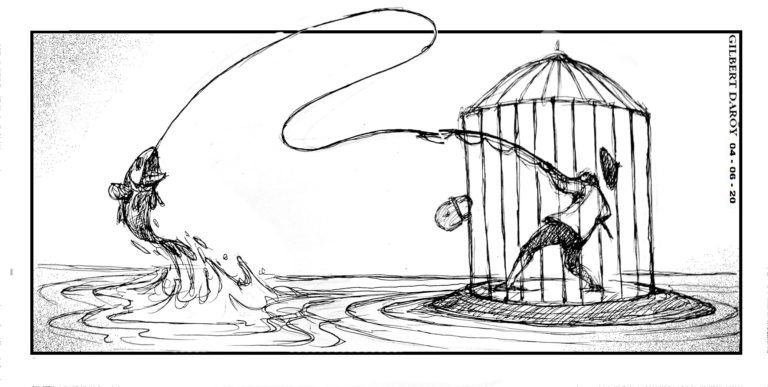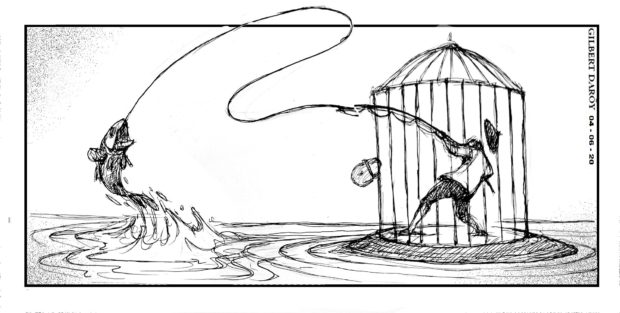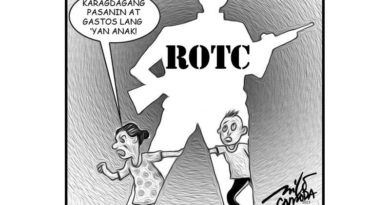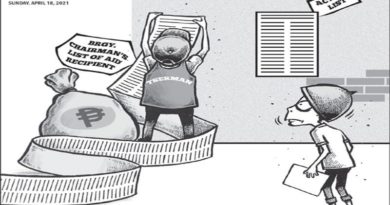EDITORIAL-CARTOONS: Modified quarantine
THE EDITOR

.
Modified quarantine
Key decision-makers in government and the private sector are divided on what to do after the one-month enhanced community quarantine (ECQ) ends on April 14 in Metro Manila, and two days earlier in Luzon. Some are pushing for an outright extension of at least two more weeks, while others are pressing the government to ease the lockdown, especially in the metropolis.
.
READ MORE: https://opinion.inquirer.net/128655/modified-quarantine
.
While stopping the spread of the virus is of paramount concern, equally important is ensuring that all the people affected by the lockdown have access to basic necessities, especially food, and that the country’s economy is able to survive the pandemic.
 Ads by: Memento Maxima Digital Marketing
Ads by: Memento Maxima Digital Marketing
@ [email protected]
– SPACE RESERVE FOR YOUR ADVERTISEMENT
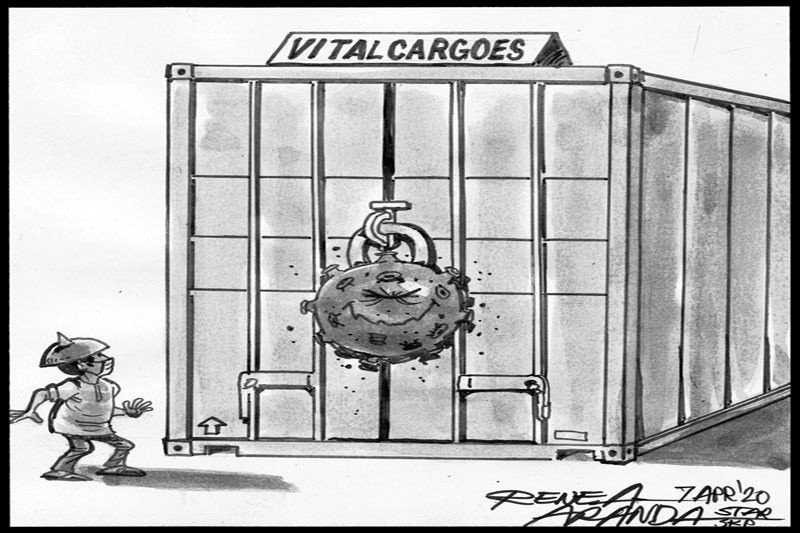
EDITORIAL – No entry
While supermarkets and grocery stores wait for the speedy replenishment of their merchandise, shipping containers filled with finished products and raw materials for the manufacture of essential items are piling up at Manila’s international and domestic ports.
The inevitable result is a slowdown in the distribution and production of items that are in high demand during the enhanced community quarantine, from instant noodles to canned sardines and toilet paper, and even medical supplies.
.
 Ads by: Memento Maxima Digital Marketing
Ads by: Memento Maxima Digital Marketing
@ [email protected]
– SPACE RESERVE FOR YOUR ADVERTISEMENT
.

EDITORYAL- Pati checkpoints sinakop ng barangay
Ipinag-UTOS na ni Philippine National Police Deputy Chief for Operations and Joint Task Force Corona Virus Shield head Lt. Gen. Guillermo Eleazar noong Sabado na alisin ang checkpoints na inilagay ng barangay dahil sa maraming sumbong na ang mga cargo truck ng basic commodities ay hinaharang at naaatrasado ang delivery sa mga palengke. Maliwanag ang utos ni Eleazar na walang barangay checkpoints sa national highway at provincial road. Tanging mga pulis na nakauniporme lamang ang magsasagawa ng checkpoints sa mga pangunahing kalsada. Isang paglabag ang ginagawa ng barangay sa guidelines kaugnay sa ipinatutupad na Enhanced Community Quarantine (ECQ).
.
MAGBASA PA MORE: https://www.philstar.com/pilipino-star-ngayon/opinyon/2020/04/06/2005698/editoryal-pati-checkpoints-sinakop-ng-barangay
.
Dapat maimbestigahang mabuti ni Eleazar ang patuloy na pagse-setup ng barangay checkpoints at kasuhan ang mga opisyal ng barangay na hindi sumusunod. Kakapusin ng pagkain ang mamamayan kapag nagpatuloy ang ginagawang ito. Buwagin ang mga checkpoint sa barangay. Nararapat makialam na ang Department of Interior and Local Government (DILG) sa isyung ito. / Pilipino Star
 Ads by: Memento Maxima Digital Marketing
Ads by: Memento Maxima Digital Marketing
@ [email protected]
– SPACE RESERVE FOR YOUR ADVERTISEMENT

No excuse for gel shortage
.
Apart from face masks, another item which may prove to be crucial in our fight against the novel coronavirus disease (Covid-19) is alcohol-based hand sanitisers.
The World Health Organization has repeatedly emphasised the importance of regular hand-washing as an effective way of preventing the spread of Covid-19. Some experts have even said that keeping our hands clean is the best way to prevent an infection, as studies have shown that people are more likely to catch the virus from touching their faces after getting in contact with a tainted surface, rather than breathing in contaminated droplets from an infected individual.
This is why alcohol-based hand sanitisers play an important role during an outbreak, as it helps prevent further spread of the disease.
Unfortunately, such disinfectants have become a rare sight. The shortage doesn’t only compromise the state’s disease prevention efforts, but also affects those who actually need hand sanitisers for daily use, which include patients undergoing dialysis, as well as diabetics who require rubbing alcohol to disinfect their wounds.
In reality, such a shortage should not happen in Thailand, wherein supplies of ethanol — pure ethyl alcohol — are plentiful.
According to the Excise Department, Thailand has a combined production capacity of as much as 7.39 million litres of ethanol each day, supplied by the Liquor Distillery Organisation, seven liquor producers and 26 ethanol-producing plants. The country also has about 100 million litres of ethanol reserves. On paper, such abundant supplies should be more than enough for everyone in the country.
Ridiculously, while alcohol-based sanitisers are a rare sight in pharmacies these days, they could be easily found online, albeit at several times their regular prices.
The government may blame the shortage of face masks on the lack of raw materials needed to make them. But given the abundance of raw material required to make alcohol-based disinfectants, there is no excuse.
Ethanol producers were previously banned from selling pure ethyl alcohol for other purposes, except energy. It wasn’t until the middle of last month when the Energy Ministry allowed the country’s 26 ethanol plants to sell their leftover ethanol to produce alcohol-based hand sanitisers.
But the situation has yet to improve. Hoarding of such products has been widely reported. Recently, police raided a house in Nonthaburi and seized 10,000 litres of alcohol. The extent of hoarding must be huge, considering alcohol-based gels are still in short supply, despite an additional one million litres of pure alcohol released to the market each day.
In light of the rising number of infections, authorities must speed up their work and solve this problem immediately. What the Energy Ministry and Excise Department have done is simply not enough.
The Energy Ministry should reduce production of ethanol fuel to allow producers to release more pure alcohol to the market, since world fuel prices have drastically dropped. This will help bring down prices of alcohol-based sanitisers, which will punish and deter hoarders.
Meanwhile, the Excise Department needs to adjust its regulations to support the production of alcohol-based hand sanitisers. Currently, producers who want to buy ethanol to produce hand sanitisers are required to seek permission from the provincial excise office where the ethanol plants are situated.
These complicated procedures must be immediately eased.
BANGKOK POST EDITORIAL COLUMN

